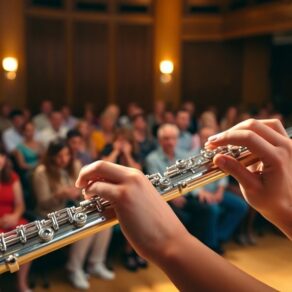Flutists are reshaping the world through their music by bridging cultural gaps and advocating for social justice. They're not just performing; they're acting as ambassadors, fostering understanding and appreciation of diverse musical heritages. Many engage in community empowerment, using their art to address significant issues like racial inequality and mental health. Sustainability is also a focus, with flutists promoting environmental awareness through eco-friendly compositions and outreach. Their innovative educational programs make music more accessible, nurturing creativity among aspiring musicians. As you explore more, you'll uncover how these talented individuals are forging global unity through their artistry.
Key Takeaways
- Flutists act as cultural ambassadors, promoting cross-cultural harmony and understanding through diverse musical traditions and performances.
- They advocate for social justice, using music to address critical issues like racial inequality, gender rights, and mental health awareness.
- Environmental activism is embraced by flutists who create eco-friendly compositions and engage communities in sustainability efforts through music.
- Innovative educational programs make flute learning accessible, empowering individuals and fostering creativity through technology and diverse teaching methods.
- Global collaborations among flutists promote unity, respect, and dialogue, celebrating shared humanity and diversity through collective musical efforts.
Pioneers of Cultural Exchange
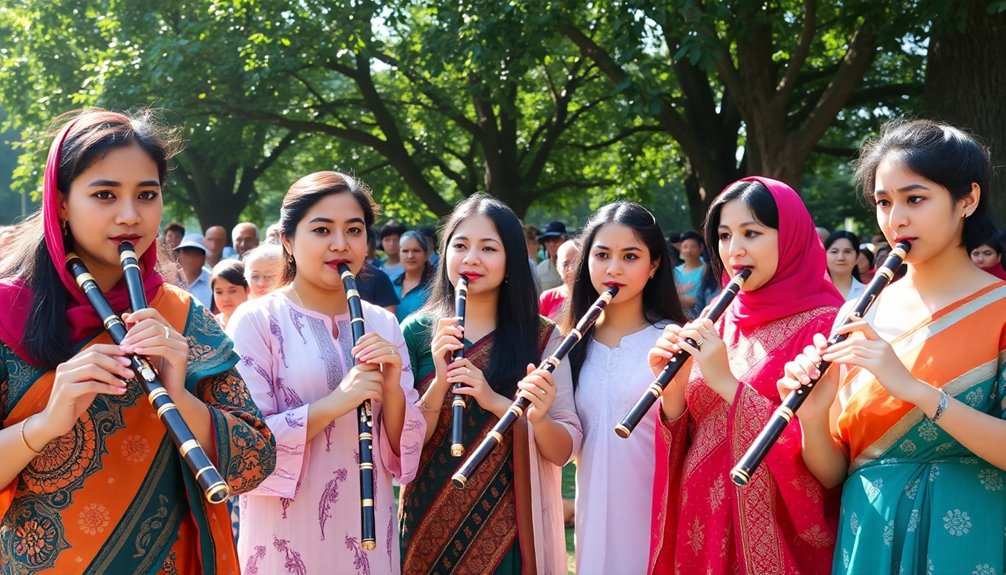
Throughout history, countless flutists have served as pioneers of cultural exchange, bridging gaps between diverse musical traditions. By embracing their unique musical heritage, these artists have fostered understanding and appreciation among varied communities.
You may find it fascinating how flutists utilize cultural diplomacy to connect with audiences, not only sharing their own culture but also inviting others to explore new sounds and styles.
Imagine attending a performance where a flutist seamlessly weaves together elements of traditional folk music with contemporary jazz. In that moment, the air becomes charged with the energy of shared experiences and histories. This isn't just music; it's a dialogue that transcends language barriers. Through their art, flutists invite you to reflect on your own cultural background while celebrating the beauty of diversity. Additionally, their mastery of articulation techniques allows them to convey emotional depth and nuance in their performances, enriching the listener's experience.
Moreover, these musicians often engage in collaborative projects, forging partnerships that enhance mutual respect and understanding. By doing so, they create an inclusive space that welcomes everyone, encouraging you to discover the richness of global musical traditions.
Ultimately, flutists play an essential role in creating a more connected world, reminding us that music can bridge divides and foster a sense of belonging among all people.
Advocates for Social Justice

Flutists are increasingly becoming powerful advocates for social justice, using their instruments as tools for change. They engage in musical activism, blending melodies with messages that resonate deeply within social movements. Through their performances, flutists address issues like racial inequality, gender rights, and mental health awareness, forging connections between their art and the pressing concerns of society.
When you listen to a flutist advocating for social justice, you're not just hearing music; you're experiencing a call to action. These musicians often collaborate with community organizations, using concerts as platforms to raise awareness and funds for various causes. Their passion transforms each note into a rallying cry, urging listeners to reflect and respond. This collaborative practice not only enhances their performance skills but also nurtures a supportive environment for musical exploration.
This blend of artistry and advocacy fosters a sense of belonging among those who share similar values. By participating in these events, you become part of a collective effort, uniting with others who believe in creating a more equitable world.
In this way, flutists not only entertain; they inspire change, reminding us all that music can amplify voices and ignite movements toward justice.
Environmental Activism Through Music
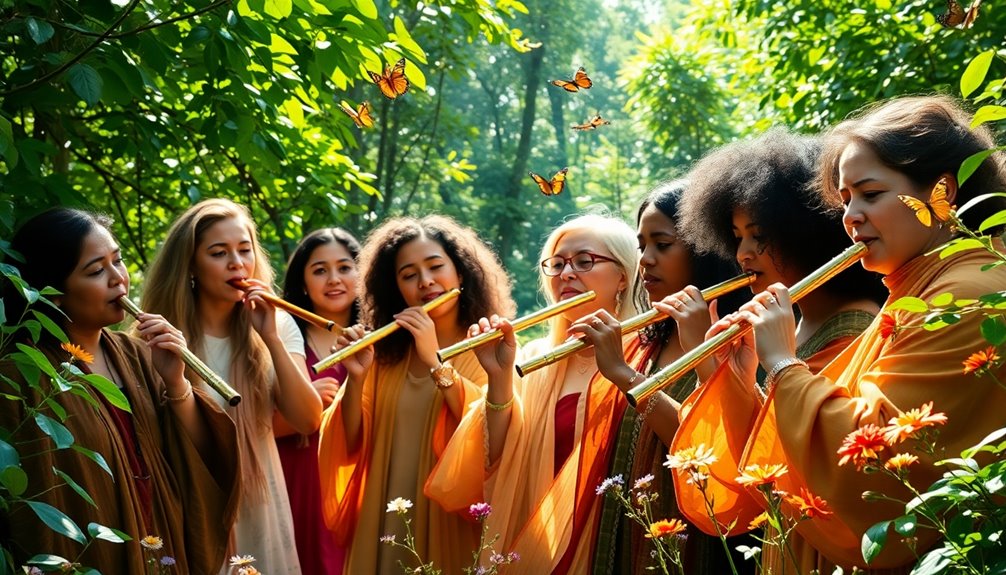
As social justice movements gain momentum, flutists are also turning their attention to environmental activism, recognizing the interconnectedness of these essential issues. You might be surprised to learn how eco-friendly compositions are reshaping the music landscape. By weaving themes of nature and conservation into their works, flutists create a narrative that resonates with audiences, encouraging them to reflect on their own impact on the planet.
Sustainable performances are another significant aspect of this movement. Many flutists are adopting environmentally responsible practices, from using recycled materials for instruments to utilizing energy-efficient venues. This shift not only reduces their carbon footprint but also inspires fellow artists and fans to reflect on their own choices. Additionally, the versatility of the concert flute allows for a wide range of expressive performances that can beautifully convey messages of environmental awareness.
Moreover, by collaborating with environmental organizations, flutists amplify their message, using their platforms to raise awareness and funds for pressing ecological issues. Engaging in conversation and action within their communities, they foster a sense of belonging among like-minded individuals who share a passion for both music and the environment.
In this way, flutists aren't just artists; they're advocates, proving that the power of music can indeed ignite change for a more sustainable future.
Building Community Through Collaboration
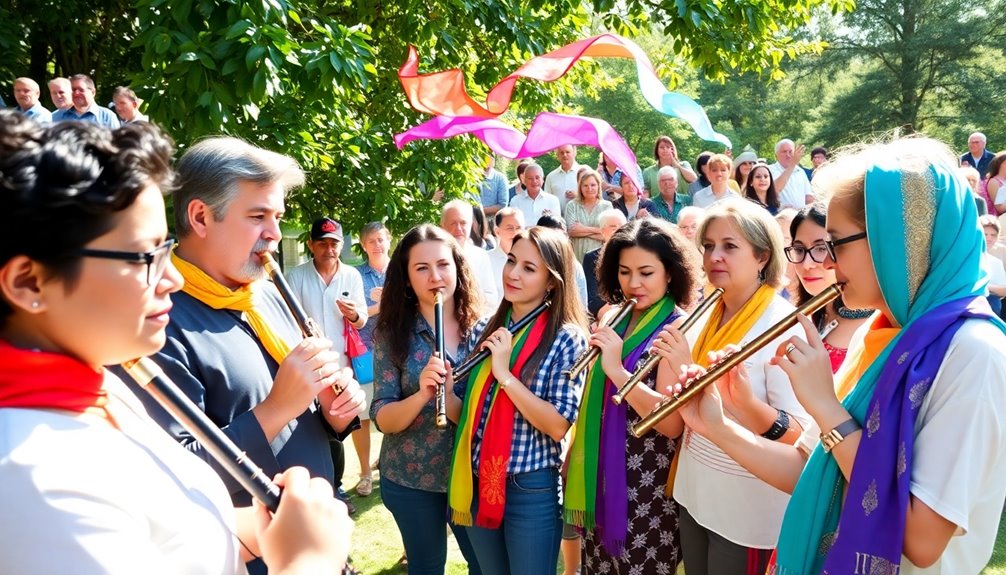
While many might think of music as a solitary endeavor, the world of flutists proves that collaboration can create vibrant communities. By engaging in community projects, flutists not only enhance their own artistry but also foster a sense of belonging among diverse groups.
When you participate in collaborative projects, you're building bridges between individuals and cultures, enriching the musical landscape around you.
Through these efforts, flutists can:
- Create inclusive spaces: Welcoming musicians from various backgrounds encourages a rich exchange of ideas.
- Develop mentorship opportunities: Experienced flutists can guide newcomers, nurturing their skills and confidence.
- Host workshops and performances: These events promote community engagement, allowing members to share their talents and learn from one another.
- Support local causes: Collaborating with organizations amplifies the impact of music, addressing social issues through artistic expression.
Engaging in such collaborative projects not only strengthens your connection to fellow musicians but also empowers communities, as seen in the diverse range of musical styles found in Selected Duets for Flute Vol. 2.
Innovative Educational Programs
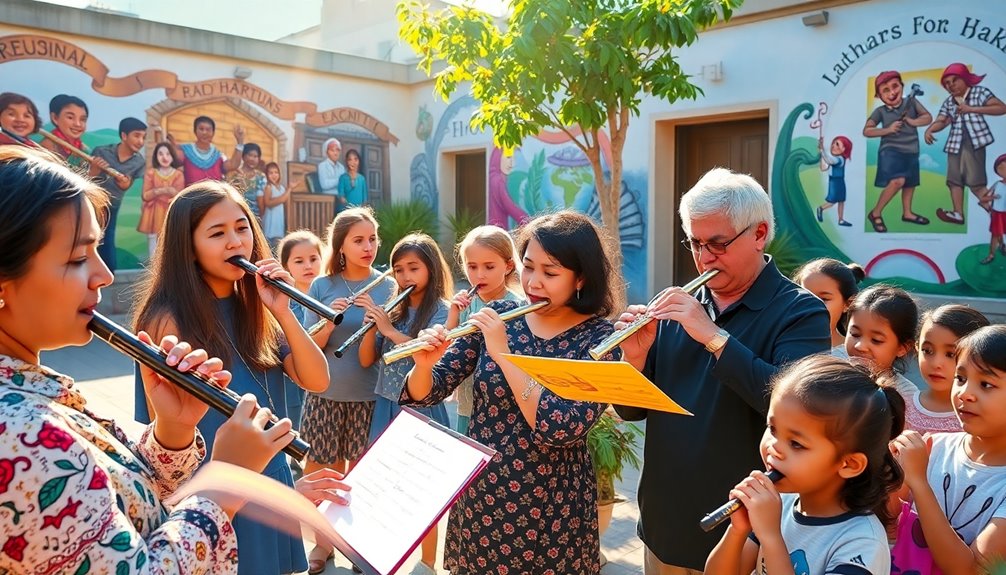
Innovative educational programs are revolutionizing how flutists learn and engage with music. By integrating technology, interactive tools, and diverse teaching methods, these programs create an inclusive atmosphere where every student feels a sense of belonging.
You'll find that music education isn't just about mastering the flute; it's about fostering creativity, collaboration, and lifelong passion for music.
Flute workshops are at the forefront of this change, offering unique experiences that go beyond traditional instruction. They emphasize hands-on learning, allowing you to experiment with different styles and techniques while connecting with other flutists.
This communal approach helps you build relationships and exchange ideas, enhancing your understanding of music in a supportive environment.
Moreover, these programs often incorporate online platforms, enabling you to engage with a global community of flutists. You can share your progress, seek feedback, and even participate in virtual performances. This accessibility breaks down barriers, making music education more equitable and enriching for everyone.
Additionally, many tutorials offer structured lessons that promote systematic learning progression for self-learners, enhancing your educational experience.
Ultimately, innovative educational programs empower you to explore your musical identity, connect with others, and contribute to a vibrant, creative community that celebrates the art of flute playing.
Inspiring Global Unity

The sense of community fostered by innovative educational programs extends beyond local interactions, reaching into the heart of global unity through music.
When flutists embrace their roles as ambassadors of sound, they create pathways for cross-cultural harmony and musical diplomacy. You might wonder how these artists can inspire connection among diverse communities.
Consider the following ways they achieve this:
- Collaborative performances that showcase various musical traditions, promoting understanding.
- Workshops and masterclasses that encourage musicians from different backgrounds to share their techniques and stories.
- Community outreach initiatives that bring music education to underprivileged areas, fostering a sense of belonging.
- Social media campaigns that amplify voices from around the world, creating a global dialogue through music.
These efforts not only celebrate the uniqueness of each culture but also highlight our shared humanity.
By participating in or supporting these initiatives, you help build a bridge across borders, nurturing relationships that transcend language and geography.
In this way, flutists not only entertain but also empower, inspiring global unity through the universal language of music. Additionally, the availability of flute sheet music and resources online allows musicians to access diverse repertoires and collaborate more effectively.
Frequently Asked Questions
What Instruments Do These Flutists Typically Play?
When you explore the world of flutists, you'll notice they typically play various flute types, including concert flutes, piccolos, and alto flutes.
Each type offers a unique sound and range, allowing for diverse musical expressions.
Popular instrument brands like Yamaha, Powell, and Miyazawa are often favored for their quality and craftsmanship.
Understanding these choices not only enhances your appreciation for their artistry but also connects you with the vibrant community of flutists.
How Do Flutists Choose Their Music Repertoire?
When you immerse yourself in repertoire selection, it's like choosing the soundtrack to your life!
Flutists often let their musical influences shape their choices, picking pieces that resonate with their emotions and experiences. You'll find them exploring everything from classical masterpieces to contemporary works, all aiming to convey a unique story.
What Is the History of the Flute?
The history of the flute reveals its ancient origins, tracing back thousands of years to early civilizations.
You'll find flutes made from various materials, like wood and bone, highlighting their cultural significance across diverse societies.
As a versatile instrument, the flute has evolved in design and technique, influencing countless musical traditions.
Understanding its journey not only enriches your appreciation of music but also connects you to a shared heritage that spans generations.
How Can I Learn to Play the Flute?
Aren't you curious about how to master the flute?
Start by familiarizing yourself with basic flute techniques, like breath control and finger placement. Establish a consistent practice routine, dedicating at least 30 minutes daily to improve your skills.
Consider joining a group or finding a mentor; it fosters a sense of belonging and motivation.
Are There Famous Flute Composers From History?
Yes, there are several famous composers who've profoundly influenced flute music throughout history.
Think of J.S. Bach, whose intricate flute sonatas showcase the instrument's expressive potential.
Mozart also made waves with his Flute Concerto No. 1, blending elegance and technical brilliance.
Debussy pushed boundaries with his impressionistic style, expanding the flute's role in orchestral music.
Conclusion
In a world where music shapes culture and drives change, flutists play an essential role. Did you know that over 70% of people believe music has the power to unite communities? By embracing their artistry for social justice, environmental awareness, and educational initiatives, these musicians not only transform lives but also inspire action. As they weave melodies into movements, they remind us that every note can contribute to a brighter, more connected world. Let's celebrate their impact together!




